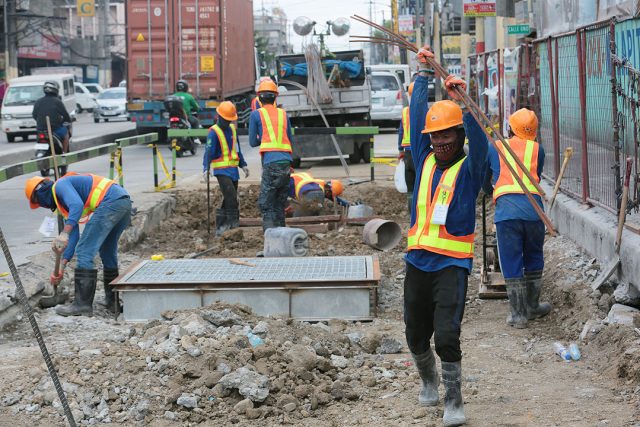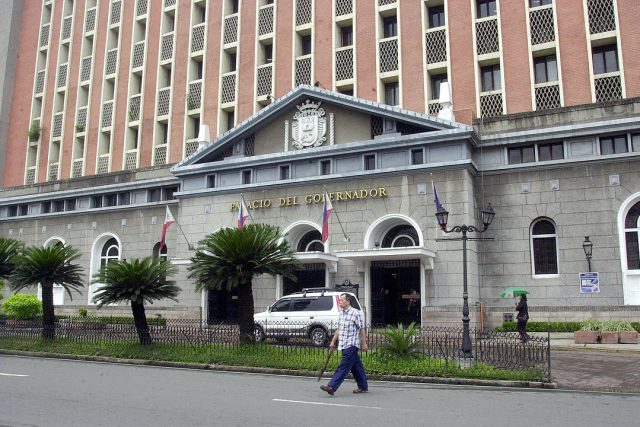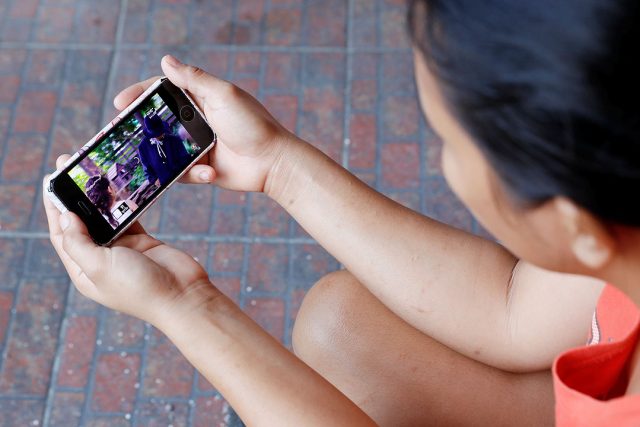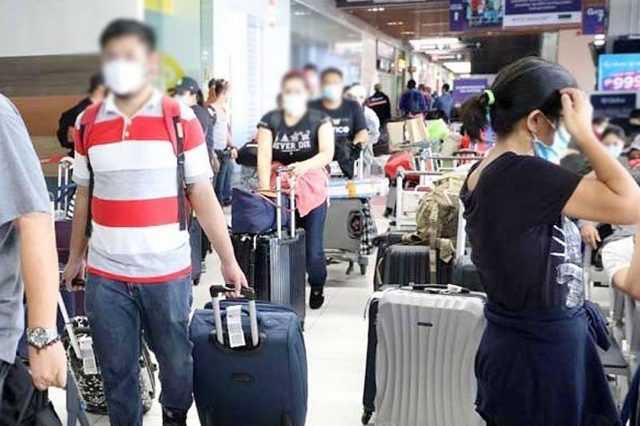The Philippines’ growth scenario has somehow turned optimistic, with the belief that we can probably return to the 2019 level of Gross Domestic Product (GDP, the monetary value of all finished goods and services made within a country during a specific period) of P19.38 trillion by around the third quarter 2022. GDP size contracted to only P17.53 trillion in 2020.
Such optimism is not reflected in the government’s fiscal position because it continues to deteriorate. For instance, government borrowings per month on average were P73 billion in 2019, then shot up to P208 billion in 2020, and P247 billion until October 2021. More borrowings, higher public debt today means higher taxes tomorrow.
In 2017, the budget deficit (revenues lower than expenditures) was only P351 billion and government raised many excise taxes. Oil and coal products were among those taxed higher (see Table 1).

Tax pressure will begin in 2022 as the new administration will have to raise some existing taxes or create new ones and oil products are likely among those that will be affected. When oil prices are high, partly due to high oil taxes, many people shift to motorcycles because the oil mileage on average is three to five times better than cars. For those who are scared to drive motorcycles or ride bicycles and are in a hurry, they will take a motorcycle taxi, which is cheaper than a regular (car) taxi.
Compared to neighbors in the ASEAN, the Philippines has a modest number of registered motorcycles — 7.33 million in 2020 including tricycles, lower than eight million in 2019 probably because many motorcycle owners did not register their vehicles anymore.
The number of taxis in the Philippines has also declined from the 2013 level, probably because technology and app-based ride hailing cars have become more popular (see Table 2).
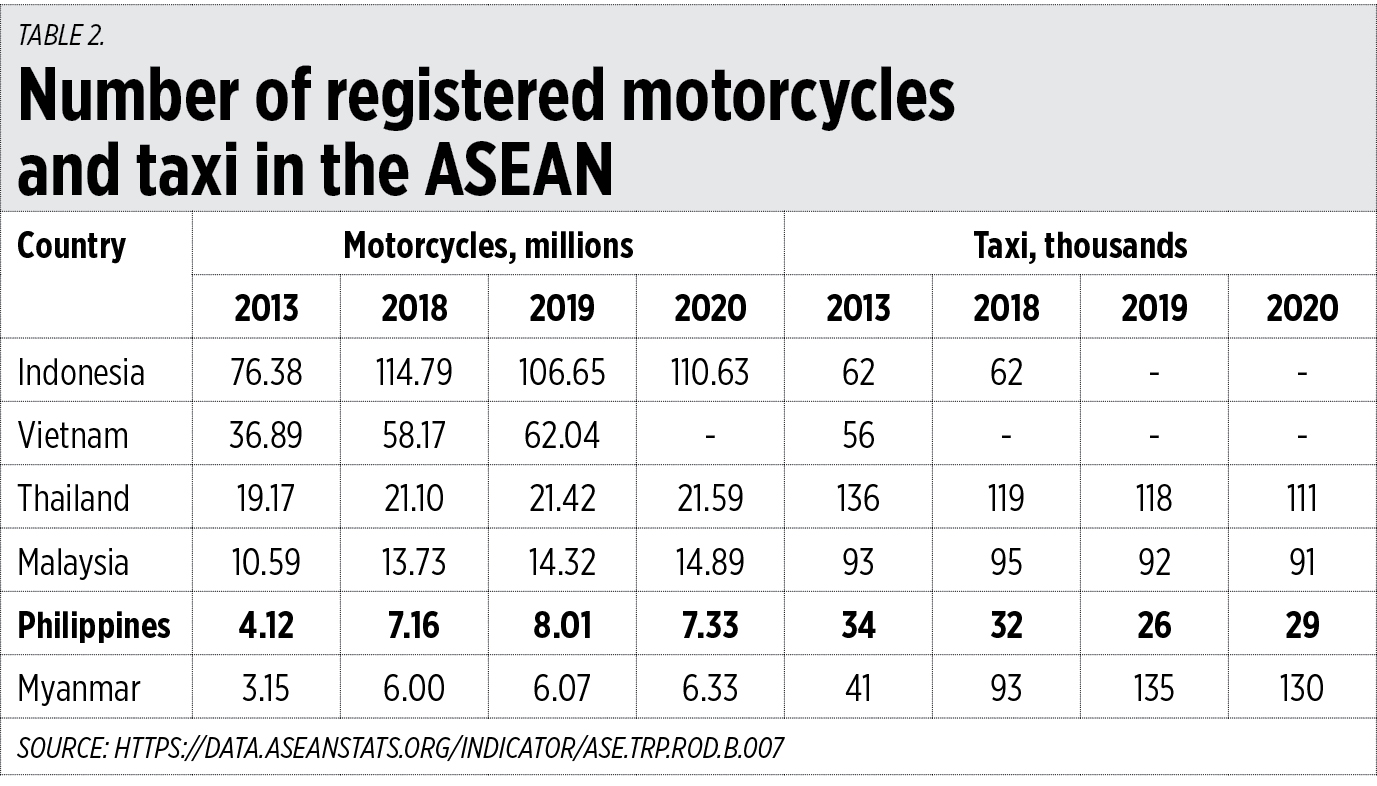
MOTORCYCLE TAXI
Currently there is no law that allows motorcycle (MC) taxis so a bill was filed, but Congress wanted data to guide them in crafting the bill. So, a pilot project was launched with three players — Joyride, Angkas, and Move It — as participants. A fourth player, Grab Philippines, was not included, with no clear reason why. The pilot project has been ongoing for almost two years already and overseen by the MC Taxi Technical Working Group (MCT TWG), composed of the Department of Transportation (DoTr), the Land Transportation Office (LTO), Land Transportation Franchising and Regulatory Board (LTFRB), Metropolitan Manila Development Authority (MMDA), Philippine National Police (PNP), and Inter-Agency Council for Traffic (I-ACT).
Meanwhile, illegal “habal-habal” motorcycle taxis freely operate in many areas of the country, especially in Mindanao, and even in Metro Manila. They exist because there is passenger demand.
Consider these three recent reports in BusinessWorld:
1. “Grab PHL, MOVE IT partner for motorcycle taxi hailing services” (Sept. 23),
2. “Transport workers allocated P10 billion for service contracts” (Nov. 22),
3. “Motorcycle taxis are here to stay,” Opinion by Enrique F. Nitura (Nov. 23).
Report No. 1 is about the entry of Grab Philippines as a fourth player in MC taxi. The Grab PHL and Move It partnership was allowed by the MCT TWG on Sept. 23, and cancelled by Oct. 1.
Report No. 2 is about the government subsidy to bus companies, mainly in Metro Manila, that give “Libreng Sakay” (free rides), also certain jeepney groups. Such a subsidy however, is not extended to regular taxis or motorcycle taxis.
Report No. 3 is an opinion by the author that one problem is an antiquated Land Transportation and Traffic Code (RA 4136, 1964) which does not consider motorcycles as public utility automobiles.
SEN. RALPH RECTO ON MOTORCYCLE TAXIS
On Oct. 11, 2020, Senate President Pro Tempore Ralph G. Recto issued a press statement arguing that “Allowing motorcyle taxis will save jobs, expand transport options without need for government bailout… one job-creating public service that will not cost the government a single centavo… one motorcycle taxi driver back on the road is one ayuda recipient off the list. And a big chunk of the cost of gas they buy are taxes that help pay for health services.”
Mr. Recto added that “stringent health and safety standards” be put in place. On the high joblessness rate, “One culprit is the lack of transportation. We’ve given too much focus on ease of doing business for corporations. We should also find ways on how there can be ease of going to work for employees.”
Amen to that, Sen. Ralph.
In a Philippine Daily Inquirer story on Dec. 8, “Motorcycle taxis in PH: Weighing convenience, safety,” it reported the following:
“In February 2020, the Technical Working Group (TWG) on motorcycle taxis said 46,713 motorcycles had been registered in the government’s initial move to allow their operations on condition of documentary and regulatory completion based on the TWG’s revised guidelines.
“… In November 2020, as COVID-19 lockdowns were eased, 10,400 riders (6,400 from Angkas and 4,000 from Joyride) were allowed to operate motorcycle taxis.
“… the Metro Manila Development Authority said an average of 86 motorcycle-related accidents occurred daily in Metro Manila in 2019. A total of 31,729 accidents were reported while 221 individuals died.”
So, a duopoly, Angkas and Joyride, has legal entity to continue motorcycle taxi operation even without legislation. Whether the duopoly provides insurance for the passengers in case of serious accidents is not clear.
THE TWG DECISION
On Dec. 10, the MCT TWG permanently terminated the Grab-Move It collaboration. It recognized that the partnership had generated jobs and served the public, but decided to stop the partnership because they had already anointed a duopoly. Move It seems to be a small third player and still training and recruiting drivers.
The TWG has ruled that the fourth player, and perhaps other future players, can come in only if the bill legalizing motorcycle taxis has become a law.
There are bad implications in this decision by the TWG.
One, they have anointed a duopoly — they allowed only Joyride and Angkas to continue operating without legislation while waiting for the final legislation.
Two, they have deprived thousands of aspiring motorcycle taxi drivers from other players the right to earn an income. As Mr. Recto said, these drivers do not aspire for even a single centavo of subsidy from taxpayers, they just want to work, legally.
Three, they have deprived thousands of passengers, people who need the speed and low fares of motorcycle taxis and who are scared or unable to drive a motorcycle even if they can afford to buy one.
Four, it creates a moral hazard problem in Congress and lobbyists for the duopoly. If Congress fails to enact the bill into a law before the elections of 2022 or after, the duopoly is protected and granted the continued privilege to operate.
THE WAY FORWARD
To avoid the four pitfalls mentioned above, the TWG should allow more players to come in while waiting for legislation. Give justice to the aspiring drivers and passengers needing more choices. Whatever safety regulations are required of the duopoly should apply to the new players. Enough of bureaucratic restrictions and prohibitions.
Congress should also hasten the legislation allowing motorcycle taxis and invite as many players to join as possible. More competition and more choices are always in favor of the passengers.
Bienvenido S. Oplas, Jr. is the president of Minimal Government Thinkers.
minimalgovernment@gmail.com




